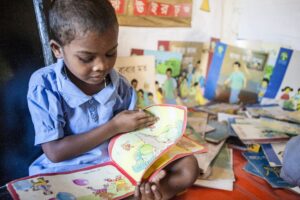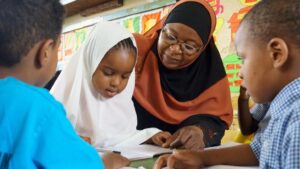Over the past months, we’ve learned that COVID-19 is more than a health crisis. The pandemic has disrupted our regular way of life and is changing how we interact with one another. For many young children, the pandemic has raised significant barriers to accessing education.
For Sweta Shah, Global Lead for Early Childhood Development (ECD) at Aga Khan Foundation, there is good reason to be concerned. During our Mind the Gap digital event, she noted that school closures and makeshift virtual programs are not ideal, especially for young children.
“We know that a number of countries are probably going to have a full year where children won’t have access to any sort of education,” Sweta says. “Our approach at Aga Khan Foundation is very much interactive, play-based learning. The fact that schools are closed, or they’re virtual in some places, is really concerning to us.”

But in the midst of crisis, there has also been innovation. “We’ve taken a number of steps to really address [these concerns], support government, and support our communities,” says Sweta.
In Kenya, Aga Khan Foundation, with support from the Government of Canada, partnered with Nation Media Group, starting a nationwide television program for children called Night-time Tales. It was fun for families to gather around a TV, but it also illustrated for parents how storytelling can help children build many 21st century skills – giving parents a new way of participating in their children’s education.
A similar radio program was also rolled out by the Madrasa Early Childhood Program in Tanzania, disseminating short literacy and numeracy programs in short 10 to 15 minute spots. There have also been innovations through SMS and WhatsApp to keep teachers and parents connected with each other for peer-to-peer support.
These innovations are promising as we move forward in continuing to support education in our most remote geographies, says Sweta.
“Some of these actions that came about because of COVID we’re going to want to keep to some degree as well, even when schools open,” she says.

Another bright spot for Sweta has been how involved parents have become in their children’s education.
“As an ECD community… we promote parents as the first and most important teachers for their children,” says Sweta. “I think another silver lining is [how] parents are learning through this process about their own role.”
Working closely with parents has also created an opportunity to deliver home messages about gender equality and the importance of girls’ education. For instance, learning materials use examples and pictures that challenge harmful gender norms, such as the notion that girls should take on a greater share of the household work than boys.
Research on early childhood tells us how important the first few years of life are to a person’s capacity to grow, learn, and succeed over their lifespan. As the pandemic continues to change the way we live, Aga Khan Foundation remains committed to improving quality of life in the communities where we work. This includes ensuring children are able to flourish in the years to come, even in challenging circumstances.
Watch our full conversation with Sweta, hosted by Khalil Z. Shariff, Chief Executive Officer of Aga Khan Foundation Canada:
Learn more about how AKF is supporting education during the pandemic:
- Listen to this bonus episode of Behind the Pages, a podcast by the Inter-agency Network for Education in Emergencies. In this episode, Sweta discusses Early Childhood Development in Emergencies.
- Read this blog from AKFC program manager Tracey Evans about how our field programs have adapted to COVID-19
With support from:

